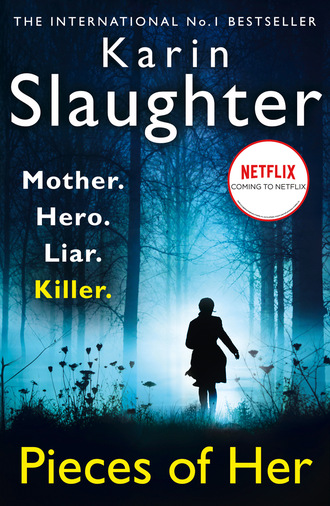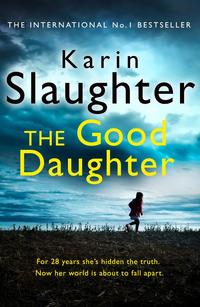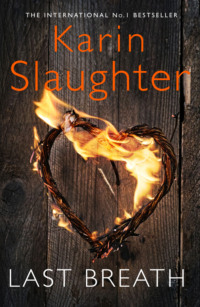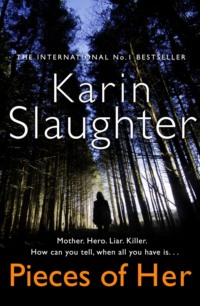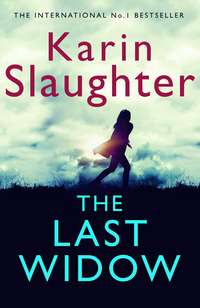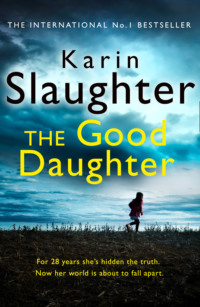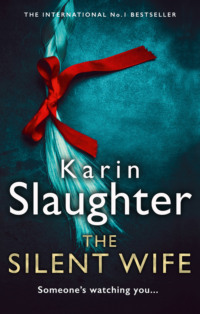Andy felt a lump in her throat. Her eyes started to water. There was a stillness around them. She could hear the sound of her own blood swooshing through her veins.
“Well.” Laura laughed, another well-worn tactic for lightening an emotional moment. “Gordon thinks I should give you a deadline to move out.”
Gordon. Andy’s father. He was a trusts and estates lawyer. His entire life was deadlines.
Laura said, “But I’m not going to give you a deadline, or an ultimatum.”
Gordon loved ultimatums, too.
“I’m saying if this is your life”—she indicated the police-like, adult-ish uniform—“then embrace it. Accept it. And if you want to do something else”—she squeezed Andy’s hand—“do something else. You’re still young. You don’t have a mortgage or even a car payment. You have your health. You’re smart. You’re free to do whatever you like.”
“Not with my student loan debt.”
“Andrea,” Laura said, “I don’t want to be a doomsayer, but if you continue listlessly spinning around, pretty soon you’ll be forty and find yourself very tired of living inside of a cartwheel.”
“Forty,” Andy repeated, an age that seemed less decrepit every year it drew closer.
“Your father would say—”
“Shit or get off the pot.” Gordon was always telling Andy to move, to make something of herself, to do something. For a long time, she had blamed him for her lethargy. When both of your parents were driven, accomplished people, it was a form of rebellion to be lazy, right? To stubbornly and consistently take the easy road when the hard road was just so … hard?
“Dr. Oliver?” an older woman said. That she was invading a quiet mother–daughter moment seemed to be lost on her. “I’m Betsy Barnard. You worked with my father last year. I just wanted to say thank you. You’re a miracle worker.”
Laura stood up to shake the woman’s hand. “You’re very sweet to say that, but he did the work himself.” She slipped into what Andy thought of as her Healing Dr. Oliver Mode, asking open-ended questions about the woman’s father, clearly not quite remembering who he was but making a passable effort so that the woman was just as clearly fooled.
Laura nodded toward Andy. “This is my daughter, Andrea.”
Betsy duplicated the nod with a passing interest. She was beaming under Laura’s attention. Everyone loved her mother, no matter what mode she was in: therapist, friend, business owner, cancer patient, mother. She had a sort of relentless kindness that was kept from being too sugary by her quick, sometimes acerbic wit.
Occasionally, usually after a few drinks, Andy could show these same qualities to strangers, but once they got to know her, they seldom stuck around. Maybe that was Laura’s secret. She had dozens, even hundreds, of friends, but not one single person knew all of the pieces of her.
“Oh!” Betsy practically shouted. “I want you to meet my daughter, too. I’m sure Frank told you all about her.”
“Frank sure did.” Andy caught the relief on Laura’s face; she really had forgotten the man’s name. She winked at Andy, momentarily switching back into Mom Mode.
“Shelly!” Betsy frantically waved over her daughter. “Come meet the woman who helped save Pop-Pop’s life.”
A very pretty young blonde reluctantly shuffled over. She tugged self-consciously at the long sleeves of her red UGA T-shirt. The white bulldog on her chest was wearing a matching red shirt. She was obviously mortified, still at that age when you didn’t want a mother unless you needed money or compassion. Andy could remember what that push-pull felt like. Most days, she wasn’t as far removed from it as she wanted to be. It was a truth universally acknowledged that your mother was the only person in the world who could say, “Your hair looks nice,” but what you heard was, “Your hair always looks awful except for this one, brief moment in time.”
“Shelly, this is Dr. Oliver.” Betsy Barnard looped a possessive arm through her daughter’s. “Shelly’s about to start UGA in the fall. Isn’t that right, sweetie?”
Laura said, “I went to UGA, too. Of course, this was back when we took notes on stone tablets.”
Shelly’s mortification amped up a few degrees as her mother laughed a little too loudly at the stale joke. Laura tried to smooth things over, politely questioning the girl on her major, her dreams, her aspirations. This was the type of prying you took as a personal affront when you were young, but as an adult, you realized these were the only types of questions adults knew how to ask you.
Andy looked down at her half-filled coffee cup. She felt unreasonably tired. Night shifts. She couldn’t get used to them, only handled them by stringing together naps, which meant that she ended up stealing toilet paper and peanut butter from her mother’s pantry because she never made time to go to the grocery store. That was probably why Laura had insisted they have a birthday lunch today instead of a birthday breakfast, which would’ve allowed Andy to return to her cave over the garage and fall asleep in front of the TV.
She drank the last of her coffee, which was so cold it hit the back of her throat like crushed ice. She looked for the waitress. The girl had her nose buried in her phone. Her shoulders were slouched. She was smacking gum.
Andy suppressed the wave of bitchiness as she stood up from the table. The older she got, the harder it was to resist the urge to become her mother. Though, in retrospect, Laura had often had good advice: Stand up straight or your back will hurt when you’re thirty. Wear better shoes or you’ll pay for it when you’re thirty. Establish sensible habits or you’ll pay for it when you’re thirty.
Andy was thirty-one. She was paying so much that she was practically bankrupt.
“You a cop?” The waitress finally looked up from her phone.
“Theater major.”
The girl wrinkled her nose. “I don’t know what that means.”
“You and me both.”
Andy helped herself to more coffee. The waitress kept giving her sideways glances. Maybe it was the police-like uniform. The girl looked like the type who would have some Molly or at least a bag of weed stashed in her purse. Andy was wary of the uniform, too. Gordon had gotten her the job. She figured he was hoping she would eventually join the force. At first, Andy had been repulsed by the idea because she’d had it in her head that cops were bad guys. Then she had met some actual cops and realized they were mostly decent human beings trying to do a really shitty job. Then she had worked dispatch for a year and started to hate the entire world, because two thirds of the calls were just stupid people who didn’t understand what an emergency was.
Laura was still talking with Betsy and Shelly Barnard. Andy had seen this same scene play out countless times. They didn’t quite know how to gracefully exit and Laura was too polite to move them along. Instead of returning to the table, Andy walked over to the plate glass window. The diner was in a prime location inside the Mall of Belle Isle, a corner unit on the bottom floor. Past the boardwalk, the Atlantic Ocean roiled from a coming storm. People were walking their dogs or riding their bikes along the flat stretch of packed sand.
Belle Isle was neither belle nor, technically, an isle. It was basically a man-made peninsula created when the Army Corps of Engineers had dredged the port of Savannah back in the eighties. They had intended the new landmass to be an uninhabited, natural barrier against hurricanes, but the state had seen dollar signs on the new beachfront. Within five years of the dredging, more than half the surface area was covered in concrete: beach villas, townhouses, condos, shopping malls. The rest was tennis courts and golf courses. Retired Northerners played in the sun all day, drank martinis at sunset and called 911 when their neighbors left their trash cans by the street too long.
“Jesus,” somebody whispered, low and mean, but with a tinge of surprise, all at the same time.
The air had changed. That was the only way to describe it. The fine hairs on the back of Andy’s neck stood up. A chill went down her spine. Her nostrils flared. Her mouth went dry. Her eyes watered.
There was a sound like a jar popping open.
Andy turned.
The handle of the coffee cup slipped from her fingers. Her eyes followed its path to the floor. White ceramic shards bounced off the white tiles.
There had been an eerie silence before, but now there was chaos. Screaming. Crying. People running, ducked down, hands covering their heads.
Bullets.
Pop-pop.
Shelly Barnard was lying on the floor. On her back. Arms splayed. Legs twisted. Eyes wide open. Her red T-shirt looked wet, stuck to her chest. Blood dribbled from her nose. Andy watched the thin red line slide down her cheek and into her ear.
She was wearing tiny Bulldog earrings.
“No!” Betsy Barnard wailed. “N—”
Pop.
Andy saw the back of the woman’s throat vomit out in a spray of blood.
Pop.
The side of Betsy’s skull snapped open like a plastic bag.
She fell sideways onto the floor. On top of her daughter. Onto her dead daughter.
Dead.
“Mom,” Andy whispered, but Laura was already there. She was running toward Andy with her arms out, knees bent low. Her mouth was open. Her eyes were wide with fear. Red dots peppered her face like freckles.
The back of Andy’s head slammed into the window as she was tackled to the ground. She felt the rush of air from her mother’s mouth as the wind was knocked out of her. Andy’s vision blurred. She could hear a cracking sound. She looked up. The glass above her had started to spiderweb.
“Please!” Laura screamed. She had rolled over, was on her knees, then her feet. “Please, stop.”
Andy blinked. She rubbed her fists into her eyes. Grit cut into her eyelids. Dirt? Glass? Blood?
“Please!” Laura shouted.
Andy blinked again.
Then again.
A man was pointing a gun at her mother’s chest. Not a cop’s gun, but the kind with a cylinder like in the Old West. He was dressed the part—black jeans, black shirt with pearl buttons, black leather vest and black cowboy hat. Gunbelt hanging low on his hips. One holster for the gun, a long leather sheath for a hunting knife.
Handsome.
His face was young, unlined. He was Shelly’s age, maybe a little older.
But Shelly was dead now. She would not be going to UGA. She would never be mortified by her mother again because her mother was dead, too.
And now the man who had murdered them both was pointing a gun at her mother’s chest.
Andy sat up.
Laura only had one breast, the left one, over her heart. The surgeon had taken the right one and she hadn’t gotten reconstructive surgery yet because she couldn’t stand the thought of going to yet another doctor, having another procedure, and now this murderer standing in front of her was going to put a bullet in it.
“Mm—” The word got caught in Andy’s throat. She could only think it—
Mom.
“It’s all right.” Laura’s voice was calm, controlled. She had her hands out in front of her like they could catch the bullets. She told the man, “You can leave now.”
“Fuck you.” His eyes darted to Andy. “Where’s your gun, you fucking pig?”
Andy’s whole body cringed. She felt herself tightening into a ball.
“She doesn’t have a gun,” Laura said, her voice still composed. “She’s a secretary at the police station. She’s not a cop.”
“Get up!” he screamed at Andy. “I see your badge! Get up, pig! Do your job!”
Laura said, “It’s not a badge. It’s an emblem. Just stay calm.” She patted her hands down the same way she used to tuck Andy into bed at night. “Andy, listen to me.”
“Listen to me, you fucking bitches!” Saliva flew from the man’s mouth. He shook the gun in the air. “Stand up, pig. You’re next.”
“No.” Laura blocked his way. “I’m next.”
His eyes turreted back to Laura.
“Shoot me.” Laura spoke with unmistakable certainty. “I want you to shoot me.”
Confusion broke the mask of anger that was his face. He hadn’t planned for this. People were supposed to be terrified, not volunteer.
“Shoot me,” she repeated.
He peered over Laura’s shoulder at Andy, then looked back.
“Do it,” Laura said. “You only have one bullet left. You know that. There are only six bullets in the gun.” She held up her hands showing four fingers on her left hand, one on her right. “It’s why you haven’t pulled the trigger yet. There’s only one bullet left.”
“You don’t know—”
“Only one more.” She waved her thumb, indicating the sixth bullet. “When you shoot me, my daughter will run out of here. Right, Andy?”
What?
“Andy,” her mother said. “I need you to run, darling.”
What?
“He can’t reload fast enough to hurt you.”
“Fuck!” the man screamed, trying to get his rage back. “Be still! Both of you.”
“Andy.” Laura took a step toward the gunman. She was limping. A tear in her linen pants was weeping blood. Something white stuck out like bone. “Listen to me, sweetheart.”
“I said don’t move!”
“Go through the kitchen door.” Laura’s voice remained steady. “There’s an exit in the back.”
What?
“Stop there, bitch. Both of you.”
“You need to trust me,” Laura said. “He can’t reload in time.”
Mom.
“Get up.” Laura took another step forward. “I said, get up.”
Mom, no.
“Andrea Eloise.” She was using her Mother voice, not her Mom voice. “Get up. Now.”
Andy’s body worked of its own volition. Left foot flat, right heel up, fingers touching the ground, a runner at the block.
“Stop it!” The man jerked the gun toward Andy, but Laura moved with it. He jerked it back and she followed the path, blocking Andy with her body. Shielding her from the last bullet in the gun.
“Shoot me,” Laura told the man. “Go ahead.”
“Fuck this.”
Andy heard a snap.
The trigger pulling back? The hammer hitting the bullet?
Her eyes had squeezed closed, hands flew to cover her head.
But there was nothing.
No bullet fired. No cry of pain.
No sound of her mother falling dead to the ground.
Floor. Ground. Six feet under.
Andy cringed as she looked back up.
The man had unsnapped the sheath on the hunting knife.
He was slowly drawing it out.
Six inches of steel. Serrated on one side. Sharp on the other.
He holstered the gun, tossed the knife into his dominant hand. He didn’t have the blade pointing up the way you’d hold a steak knife but down, the way you’d stab somebody.
Laura asked, “What are you going to do with that?”
He didn’t answer. He showed her.
Two steps forward.
The knife arced up, then slashed down toward her mother’s heart.
Andy was paralyzed, too terrified to ball herself up, too shocked to do anything but watch her mother die.
Laura stuck out her hand as if she could block the knife. The blade sliced straight into the center of her palm. Instead of collapsing, or screaming, Laura’s fingers wrapped around the hilt of the knife.
There was no struggle. The murderer was too surprised.
Laura wrenched the knife away from his grip even as the long blade was still sticking out of her hand.
He stumbled back.
He looked at the knife jutting out of her hand.
One second.
Two seconds.
Three.
He seemed to remember the gun on his hip. His right hand reached down. His fingers wrapped around the handle. The silver flashed on the muzzle. His left hand swung around to cup the weapon as he prepared to fire the last bullet into her mother’s heart.
Silently, Laura swung her arm, backhanding the blade into the side of his neck.
Crunch, like a butcher cutting a side of beef.
The sound had an echo that bounced off the corners of the room.
The man gasped. His mouth fished open. His eyes widened.
The back of Laura’s hand was still pinned to his neck, caught between the handle and the blade.
Andy saw her fingers move.
There was a clicking sound. The gun shaking as he tried to raise it.
Laura spoke, more growl than words.
He kept lifting the gun. Tried to aim.
Laura raked the blade out through the front of his throat.
Blood, sinew, cartilage.
No spray or mist like before. Everything gushed out of his open neck like a dam breaking open.
His black shirt turned blacker. The pearl buttons showed different shades of pink.
The gun dropped first.
Then his knees hit the floor. Then his chest. Then his head.
Andy watched his eyes as he fell.
He was dead before he hit the ground.
2
When Andy was in the ninth grade, she’d had a crush on a boy named Cletus Laraby, who went by Cleet, but in an ironic way. He had floppy brown hair and he knew how to play the guitar and he was the smartest guy in their chemistry class, so Andy tried to learn how to play the guitar and pretended to be interested in chemistry, too.
This was how she ended up entering the school’s science fair: Cleet signed up, so Andy did, too.
She had never spoken a word to him in her life.
No one questioned the wisdom of giving a drama club kid who barely passed earth sciences access to ammonium nitrate and ignition switches, but in retrospect, Dr. Finney was probably so pleased Andy was interested in something other than mime arts that she had looked the other way.
Andy’s father, too, was elated by the news. Gordon took Andy to the library where they checked out books on engineering and rocket design. He filled out a form for a loyalty card from the local hobby shop. Over the dinner table, he would read aloud from pamphlets from the American Association for Rocketry.
Whenever Andy was staying at her dad’s house, Gordon worked in the garage with his sanding blocks, shaping the fins and nose cone shoulders, while Andy sat at his workbench and sketched out designs for the tube.
Andy knew that Cleet liked the Goo Goo Dolls because he had a sticker on his backpack, so she started out thinking the tube of the rocket would look like a steampunk telescope from the video for “Iris,” then she thought about putting wings on it because “Iris” was from the movie City of Angels, then she decided that she would put Nicolas Cage’s face on the side, in profile, because he was the angel in the movie, then she decided that she should paint Meg Ryan instead because this was for Cleet and he would probably think that Meg Ryan was a lot more interesting than Nicolas Cage.
A week before the fair, Andy had to turn in all of her notes and photographs to Dr. Finney to prove that she had actually done all of the work herself. She was laying out the dubious evidence on the teacher’s desk when Cleet Laraby walked in. Andy had to clasp together her hands to keep them from trembling when Cleet stopped to look at the photos.
“Meg Ryan,” Cleet said. “I dig it. Blow up the bitch, right?”
Andy felt a cold slice of air cut open her lips.
“My girlfriend loves that stupid movie. The one with the angels?” Cleet showed her the sticker on his backpack. “They wrote that shitty song for the soundtrack, man. That’s why I keep this here, to remind me never to sell out my art like those faggots.”
Andy didn’t move. She couldn’t speak.
Girlfriend. Stupid. Shitty. Man. Faggots.
Andy had left Dr. Finney’s classroom without her notes or her books or even her purse. She’d walked through the cafeteria, then out the exit door that was always propped open so the lunch ladies could smoke cigarettes behind the Dumpster.
Gordon lived two miles away from the school. It was June. In Georgia. On the coast. By the time she reached his house, Andy was badly sunburned and soaked in her own sweat and tears. She took the Meg Ryan rocket and the two Nicolas Cage test rockets and threw them in the outdoor trash can. Then she soaked them with lighter fluid. Then she threw a match into the can. Then she woke up on her back in Gordon’s driveway because a neighbor was squirting her down with the garden hose.
The whoosh of fire had singed off Andy’s eyebrows, eyelashes, bangs and nose hairs. The sound of the explosion was so intense that Andy’s ears had started to bleed. The neighbor started screaming in her face. His wife, a nurse, came over and was clearly trying to tell Andy something, but the only thing she could hear was a sharp tone, like when her chorus teacher blew a single note on her pitch pipe—
Eeeeeeeeeeee …
Andy heard The Sound, and nothing but The Sound, for four whole days.
Waking. Trying to sleep. Bathing. Walking to the kitchen. Sitting in front of the television. Reading notes her mother and father furiously scratched out on a dry erase board.
We don’t know what’s wrong.
Probably temporary.
Don’t cry.
Eeeeeeeeeeee …
That had been almost twenty years ago. Andy hadn’t thought much about the explosion until now, and that was only because The Sound was back. When it returned, or when she became aware of the return, she was standing in the diner by her mother, who was seated in a chair. There were three dead people on the floor. On the ground. The murderer, his black shirt even blacker. Shelly Barnard, her red shirt even redder. Betsy Barnard, the bottom part of her face hanging by strands of muscle and sinew.
Andy had looked up from the bodies. People were standing outside the restaurant. Mall shoppers with Abercrombie and Juicy bags and Starbucks coffees and Icees. Some of them had been crying. Some of them had been taking pictures.
Andy had felt pressure on her arm. Laura was struggling to turn the chair away from the gawkers. Every movement had a stuttering motion to Andy’s eye, like she was watching a stop-action movie. Laura’s hand shook as she tried to wrap a tablecloth around her bleeding leg. The white thing sticking out was not a bone but a shard of broken china. Laura was right-handed, but the knife jutting from her left hand made wrapping her leg impossible. She was talking to Andy, likely asking for help, but all Andy could hear was The Sound.
“Andy,” Laura had said.
Eeeeeeeeeeee …
“Andrea.”
Andy stared at her mother’s mouth, wondering if she was hearing the word or reading the word on her lips—so familiar that her brain processed it as heard rather than seen.
“Andy,” Laura repeated. “Help me.”
That had come through, a muffled request like her mother was speaking through a long tube.
“Andy,” Laura had grabbed both of Andy’s hands in her own. Her mother was bent over in the chair, obviously in pain. Andy had knelt down. She’d started knotting the tablecloth.
Tie it tight—
That’s what Andy would have said to a panicked caller on the dispatch line: Don’t worry about hurting her. Tie the cloth as tight as you can to stop the bleeding.
It was different when your hands were the ones tying the cloth. Different when the pain you saw was registered on your own mother’s face.
“Andy.” Laura had waited for her to look up.
Andy’s eyes had trouble focusing. She wanted to pay attention. She needed to pay attention.
Her mother had grabbed Andy by the chin, given her a hard shake to knock her out of her stupor.
She had said, “Don’t talk to the police. Don’t sign a statement. Tell them you can’t remember anything.”
What?


